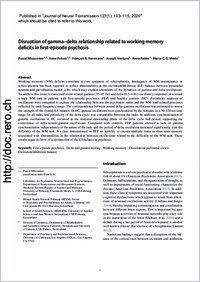Disruption of gamma–delta relationship related to working memory deficits in first-episode psychosis
- Missonnier, Pascal Laboratory for Psychiatric Neuroscience and Psychotherapy, Department of Neuroscience and Movement Sciences, Medicine Section, Faculty of Science and Medicine, University of Fribourg, Switzerland - Mental Health Network Fribourg (RFSM), Sector of Psychiatry and Psychotherapy for Adults, Marsens, Switzerland
- Prévot, Anne Laboratory for Psychiatric Neuroscience and Psychotherapy, Department of Neuroscience and Movement Sciences, Medicine Section, Faculty of Science and Medicine, University of Fribourg, Switzerland - School of Health Sciences (HEdS‑FR), University of Applied Sciences and Arts Western Switzerland
- Herrmann, François R. Division of Geriatrics, Department of Rehabilitation and Geriatrics, Geneva University Hospitals and University of Geneva, Switzerland
- Ventura, Joseph Department of Psychiatry and Biobehavioural Sciences, University of California, Los Angeles (UCLA), USA
- Padée, Anna Laboratory for Psychiatric Neuroscience and Psychotherapy, Department of Neuroscience and Movement Sciences, Medicine Section, Faculty of Science and Medicine, University of Fribourg, Switzerland
- Merlo, Marco C. G. Laboratory for Psychiatric Neuroscience and Psychotherapy, Department of Neuroscience and Movement Sciences, Medicine Section, Faculty of Science and Medicine, University of Fribourg, Switzerland
-
01.01.2020
Published in:
- Journal of Neural Transmission. - 2020, vol. 127, no. 1, p. 103–115
English
Working memory (WM) deficits constitute a core symptom of schizophrenia. Inadequacy of WM maintenance in schizophrenia has been reported to reflect abnormalities in the excitation/inhibition (E/I) balance between pyramidal neurons and parvalbumin basket cells, which may explain alterations of the dynamics of gamma and delta oscillations. To address this issue, we assessed event-related gamma (35– 45 Hz) and delta (0.5–4 Hz) oscillatory responses in a visual n-back WM task in patients with first-episode psychosis (FEP) and healthy controls (HC). Periodicity analyses of oscillations were computed to explore the relationship between the psychiatric status and the WM load-related processes reflected by each frequency range. The correspondence between nested delta–gamma oscillations was estimated to assess the strength of the frontal E/I balance. In HC, gamma oscillations were synchronized by the stimulus in a 50–150 ms time range for all tasks, and periodicity of the delta cycle was comparable between the tasks. In addition, synchronization of gamma oscillations in HC occurred at the maximal descending phase of the delta cycle half-period, supporting the coexistence of delta-nested gamma oscillations. Compared with controls, FEP patients showed a lack of gamma synchronization independently of the nature of the task, and the period of delta oscillation increased significantly with the difficulty of the WM task. We thus demonstrated in FEP an inability to encode multiple items in short-term memory associated with abnormalities in the relationship between oscillations related to the difficulty of the WM task. These results argue in favor of a dysfunction of the E/I balance in psychosis.
- Faculty
- Faculté des sciences et de médecine
- Department
- Médecine 3ème année
- Language
-
- English
- Classification
- Biological sciences
- License
- License undefined
- Identifiers
-
- RERO DOC 328212
- DOI 10.1007/s00702-019-02126-5
- Persistent URL
- https://folia.unifr.ch/unifr/documents/308511
Statistics
Document views: 56
File downloads:
- mer_dgd.pdf: 231
